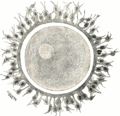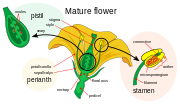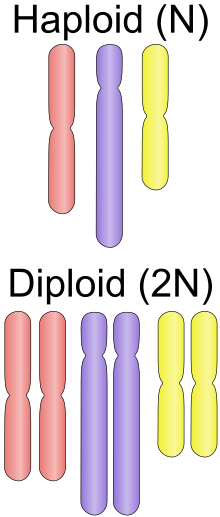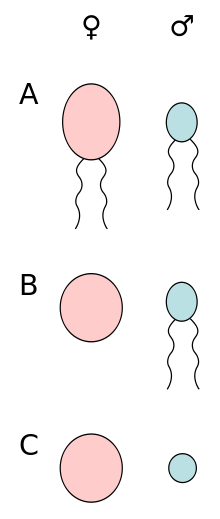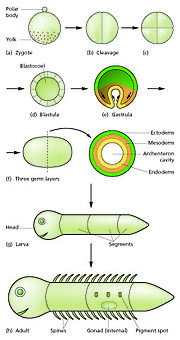The egg cell or ovum (pl.: ova) is the female reproductive cell, or gamete, in most anisogamous organisms (organisms that reproduce sexually with a larger...
14 KB (1,456 words) - 06:18, 13 August 2024
An egg is an organic vessel grown by an animal to carry a possibly fertilized egg cell (a zygote) and to incubate from it an embryo within the egg until...
42 KB (4,715 words) - 23:29, 22 August 2024
Zygote (redirect from Fertilized egg cell)
and most other anisogamous organisms, a zygote is formed when an egg cell and sperm cell come together to create a new unique organism. The formation of...
9 KB (872 words) - 21:03, 29 October 2024
organisms that produce larger, non-mobile gametes (ova, often called egg cells) are called female. An organism that produces both types of gamete is...
66 KB (7,650 words) - 11:17, 20 October 2024
biology, somatic cell nuclear transfer (SCNT) is a laboratory strategy for creating a viable embryo from a body cell and an egg cell. The technique consists...
48 KB (6,014 words) - 13:54, 28 July 2024
Cleavage (embryo) (redirect from Eight-cell stage)
individual cells. Superficial cleavage occurs in arthropods that have centrolecithal egg cells (egg cells with the yolk located in the center of the cell). This...
26 KB (2,959 words) - 13:49, 30 October 2024
Pronucleus (redirect from Egg nucleus)
sperm or egg cell during the process of fertilization. The sperm cell undergoes a transformation into a pronucleus after entering the egg cell but prior...
10 KB (1,340 words) - 23:42, 12 August 2023
Ovule (redirect from Antipodal cell)
called the embryo sac in angiosperms. The megagametophyte produces an egg cell for the purpose of fertilization. The ovule is a small structure present...
15 KB (1,935 words) - 05:10, 23 August 2024
Sperm (redirect from Sperm cell)
after fusion with egg cells during fertilization, a new organism begins developing, starting as a totipotent zygote. The human sperm cell is haploid, so...
30 KB (3,401 words) - 06:05, 28 May 2024
egg cell, a sperm must first fuse with the plasma membrane and then penetrate the female egg cell to fertilize it. While the fusion of the sperm cell...
18 KB (2,388 words) - 15:41, 1 October 2024
Double fertilization (redirect from Central cell)
to bottom) i.e. 3 antipodal cells, 1 central cell (binucleate), 2 synergids & 1 egg cell. One sperm fertilizes the egg cell and the other sperm fuses with...
16 KB (2,006 words) - 08:22, 23 July 2024
Gamete (redirect from Germ line cell)
antheridium and the egg cells by mitosis in a flask-shaped organ called the archegonium. Plant sperm cells are their only motile cells, often described as...
12 KB (1,360 words) - 06:32, 23 September 2024
cracks open at the trilete suture to allow the male gametes to access the egg cells in the archegonia inside. The gametophytes of Isoetes appear to be similar...
26 KB (3,151 words) - 05:27, 23 August 2024
to: Egg cell, the female reproductive cell (gamete) in oogamous organisms Eggs as food Egg, Austria Egg, Switzerland Egg,Germany Antonio Brack Egg (1940–2014)...
4 KB (586 words) - 20:07, 31 October 2024
flagellum as the egg travels down the fallopian tube to reach the uterus. In vitro fertilization (IVF) is a process by which egg cells are fertilized by...
25 KB (2,753 words) - 20:23, 30 October 2024
Cloning (redirect from Cell cloning)
from a somatic cell and an egg cell. In 1996, Dolly the sheep achieved notoriety for being the first mammal cloned from a somatic cell. Another example...
107 KB (11,593 words) - 15:39, 22 October 2024
Ploidy (redirect from Haploid cell)
refers to the total number of chromosomes found in a gamete (a sperm or egg cell produced by meiosis in preparation for sexual reproduction). Under normal...
54 KB (6,129 words) - 11:23, 20 October 2024
Ovulation is the release of egg cells from the ovaries as part of the ovarian cycle for most vertebrates. In women, this event occurs at the end of the...
29 KB (3,001 words) - 14:16, 9 October 2024
complex life cycle in which a gamete (haploid reproductive cells, such as a sperm or egg cell) with a single set of chromosomes combines with another gamete...
39 KB (4,846 words) - 18:25, 23 October 2024
the female egg cell by the male sperm cell. The resulting fusion of these two cells produces a single-celled zygote that undergoes many cell divisions...
36 KB (3,510 words) - 22:12, 10 September 2024
nucleus disintegrates and the two sperm cells are released; one of the two sperm cells fertilises the egg cell (at the bottom of the gametophyte near the...
45 KB (5,218 words) - 10:46, 30 October 2024
Ovarian follicle (redirect from Follicle cell)
follicles, each with the potential to release an egg cell (ovum) at ovulation for fertilization. These eggs are developed once every menstrual cycle with...
12 KB (1,271 words) - 16:04, 14 April 2024
directly from an egg without need for fertilization. In animals, parthenogenesis means development of an embryo from an unfertilized egg cell. In plants, parthenogenesis...
58 KB (6,324 words) - 07:16, 29 October 2024
Mitochondrion (redirect from Cell powerhouse)
stochastic processes in the cell to increase the cell-to-cell variability in mutant load as an organism develops: a single egg cell with some proportion of...
167 KB (18,361 words) - 20:56, 20 October 2024
fallopian tube into the uterus. If an egg cell meets with sperm on its way to the uterus, a single sperm cell can enter and merge with it, creating a...
24 KB (2,433 words) - 22:50, 30 October 2024
(symbol: ♀) if it produces the ovum (egg cell), the type of gamete (sex cell) that fuses with the male gamete (sperm cell) during sexual reproduction. A female...
29 KB (3,327 words) - 06:25, 19 September 2024
Anisogamy (category Germ cells)
form. The smaller gamete is male, a sperm cell, whereas the larger gamete is female, typically an egg cell. Anisogamy is predominant among multicellular...
37 KB (4,351 words) - 11:38, 20 October 2024
the fertilization of an egg cell (ovum) by a sperm cell (spermatozoon). Once fertilized, the ovum becomes a single diploid cell known as a zygote. The...
28 KB (3,187 words) - 13:31, 16 October 2024

